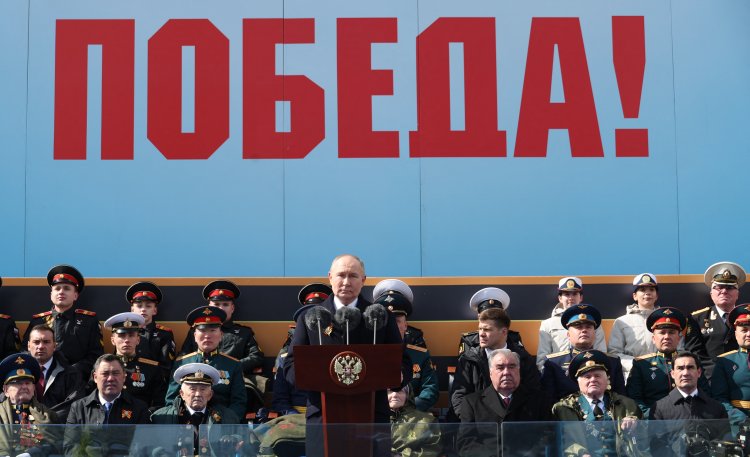7 Key Points Trump Fails to Grasp about Putin -- Editorial
For the Russian leader, maintaining peace appears to come at a greater expense than engaging in warfare.

In an interesting turn, former President Donald Trump is facilitating Putin's path to negotiations. In a rush to achieve “peace,” Trump has effectively laid out concessions and endorsed Kremlin propaganda narratives. This includes accepting the Russian claim that the invasion was a response to Ukraine’s NATO aspirations, calling for Ukraine to relinquish territory occupied by Russia, undermining Ukrainian President Volodymyr Zelenskyy’s legitimacy, and sidelining the potential for European peacekeepers by denying them a U.S. security guarantee. The White House has largely acquiesced to Moscow's perspectives and demands.
Rather than taking advantage of these concessions, accepting a ceasefire, and advancing toward a potential win, Putin is stalling. Trump envoy Stephen Witkoff held a third meeting with Putin recently, ending like the previous two with minimal progress. Two days later, Russia demonstrated its defiance through a deadly attack during Palm Sunday services, resulting in numerous casualties among worshippers.
The stark disparity between the numerous concessions made by the White House and Putin's refusal to reciprocate may have finally caught Trump's attention. When Putin demanded that Ukraine be made a ward of the United Nations as a condition for a ceasefire in the Black Sea basin—an area largely cleared of Russian warships by Ukrainian drones—Trump responded with a threat of secondary sanctions on Russian oil. Following Witkoff’s unsuccessful meeting, he posted a message expressing frustration: "Russia has to get moving. Too many people [are] DYING, thousands a week, in a terrible and senseless war.”
The reality that has eluded Trump and his administration is that Putin lacks a genuine interest in negotiating peace with Ukraine. Much of the Trump administration’s inability to recognize this is rooted in three persistent blind spots that affect almost every U.S. president's approach to Russia: ignorance of the country itself, an overconfidence in their capacity to persuade, and a failure to grasp the ideological and political motivations driving authoritarian regimes. In these aspects, Donald Trump appears to have exceeded his predecessors.
Here are seven reasons why Putin is stalling:
1. The war serves as a justification for Putin’s dictatorship. There is perhaps no better international backdrop for a dictatorship than war. As George Kennan noted, “Soviet leaders had to treat the outside world as hostile because it provided the only excuse for the dictatorship without which they don’t know how to rule.” When economic growth slowed during his third presidential term, Putin shifted the legitimacy of his regime to militarized patriotism, first demonstrated through the invasion of Crimea in 2014 and later by invading Ukraine. He requires Russia to be surrounded by enemies to justify the militarized nationalism and repression underpinning his rule.
2. Putin enjoys the symbols of militarism. He takes pleasure in the title of supreme commander in chief, donning military uniforms and awarding medals to soldiers. Concluding the war would strip him of the symbolic props that bolster his image as the defender of the homeland.
3. Russia's economy relies on the war. Since the full-scale invasion in 2022, the Russian economy has been realigned to support wartime efforts, making a transition to a peacetime economy challenging. Consumers are already feeling the impact, with year-on-year price increases for staples like bread, chicken, and macaroni soaring into double digits. The GDP growth is forecasted to be only between 1.4 and 1.6 percent this year, and with interest rates at 21 percent, a swift recovery appears unlikely. Daily hardships become more burdensome when they can no longer be rationalized as sacrifices for wartime.
4. Ending wartime benefits could incite social unrest. Ending benefits and financial incentives that society has grown to expect is a difficult challenge for any regime. Cuts to bonuses, soldiers' pay, and compensations for family members of deceased servicemen would surely lead to dissatisfaction. Many war veterans, having experienced the horrors of conflict and deeply influenced by the memory of World War II, would also have expectations for post-war privileges. Concurrently, the increase in crimes committed by veterans is already troubling for the Kremlin and could worsen with reduced benefits.
5. Change can destabilize authoritarian regimes. Sudden policy shifts, even those that might seem beneficial, pose risks for political leaders. This is particularly true in authoritarian regimes, which may seem impervious to external pressures yet lack the flexibility needed to adapt.
6. Putin is both an opportunist and a risk-taker. Each new concession from others may invite further, more audacious demands from Putin. The more Trump offers, the more likely Putin will stand firm, employing the “art of the deal.”
7. Putin seeks victory, not peace. The fundamental issue at hand is that peace is not a priority for Putin—victory is. The only means to counterbalance the instability accompanying the end of the war is through a significant victory that can alleviate post-war challenges and gratify public memory regarding the war's human cost without resorting to armed repression. Combatants typically engage in negotiations when they believe they can achieve more at the negotiation table than on the battlefield. For Putin, “better” likely means nothing short of Ukraine’s surrender. Offers and rhetorical threats have not yet dissuaded him from this belief.
In summary, Putin currently lacks sufficient motivation to end the war. What might persuade him? Transforming the incentives Trump has been offering into consequential penalties would be crucial. Enacting secondary sanctions on Russian oil imports, as recently proposed by Trump, represents one viable measure. Closing loopholes in the sanctions targeting Russia's energy sector, particularly aimed at major companies like Rosneft and Novatek, is another important step. Additionally, halting Europe’s imports of Russian LNG and addressing sanctioning gaps regarding key banks would further pressure Putin. It’s also vital to provide consistent U.S. military aid to Ukraine and significantly boost support.
Trump and his negotiators must come to understand that Putin is currently inclined to engage in any so-called peace talks solely to formalize a Ukrainian capitulation. He will prolong negotiations until he is confident of achieving this goal. There are no shortcuts to changing his mind, apart from increasing the costs of his procrastination.
Tara Stone for TROIB News
Find more stories on Business, Economy and Finance in TROIB business












